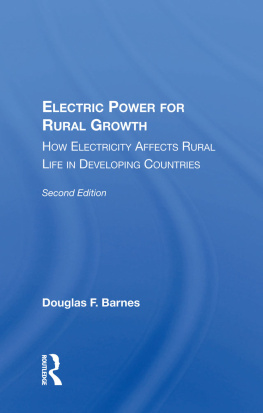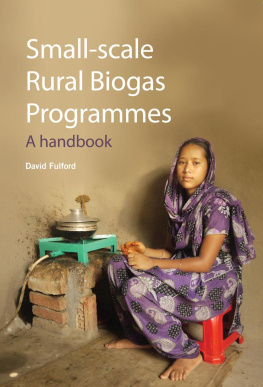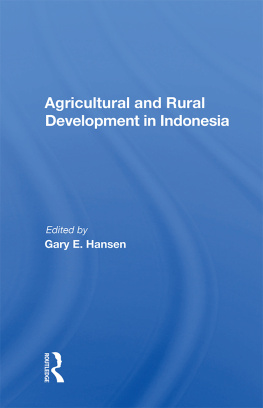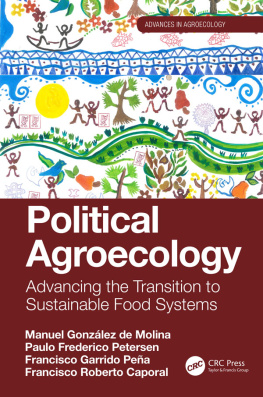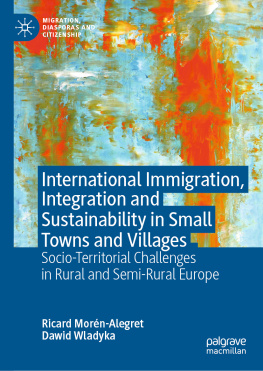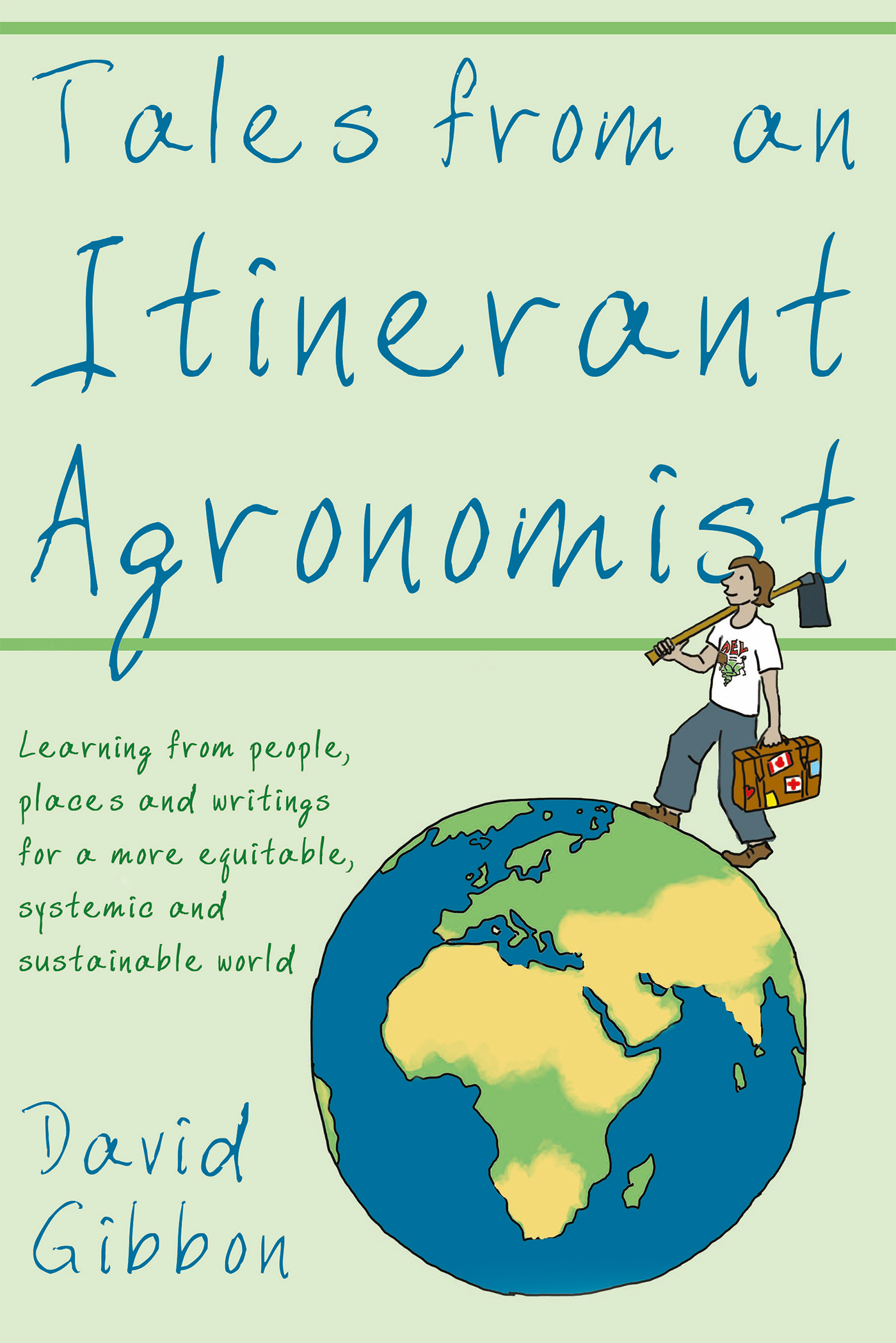Tales
from an
Itinerant
Agronomist
learning from people, pla ces and writings for a more equitable, systemic and sustainable world
David Gibbon
Copyright 2018 David Gibbon
The moral right of the author has been asserted.
Apart from any fair dealing for the purposes of research or private study, or criticism or review, as permitted under the Copyright, Designs and Patents Act 1988, this publication may only be reproduced, stored or transmitted, in any form or by any means, with the prior permission in writing of the publishers, or in the case of reprographic reproduction in accordance with the terms of licences issued by the Copyright Licensing Agency. Enquiries concerning reproduction outside those terms should be sent to the publishers.
Matador
9 Priory Business Park,
Wistow Road, Kibworth Beauchamp,
Leicestershire. LE8 0RX
Tel: 0116 279 2299
Email: books@troubador.co.uk
Web: www.troubador.co.uk/matador
Twitter: @matadorbooks
ISBN 978 1789012 699
British Library Cataloguing in Publication Data.
A catalogue record for this book is available from the British Library.
Matador is an imprint of Troubador Publishing Ltd
for Elin, Paul, James, Dominic and Kai
with huge thanks and an appreciation for your
unwavering support over many years
Contents
Preface
Origins and early drivers
What have you been doing all those years? Why have you worked and lived in so many places? Have you learned or achieved anything useful? Whats the legacy? These are just some of the questions that were asked when I began to write this story a few years ago.
I hesitated because I had a real concern about the nature and quality of some of the published old agronomists life stories which have been produced in tomes of great length (e.g. Beets, 1990; Tinsley, 2004). These are impressive works but feel rather linear and transfer of technology driven, arising out of Cartesian principles and reflecting the nature of the basic training and socio-political environments of the authors. This had a lot to do with the history and structure of agricultural science institutions in Europe and the US and whether they evolved, innovated and adapted over time. However, there are also some books about peasant agriculture, systems and livelihoods that inspired me to pursue a career in agriculture and development that were written (or edited) by some exceptional people such as Conklin, (1957), Tothill, (1940, 1948), Howard, (1940), King, (1911) and de Schlippe, (1956). These accounts, and other recent publications, recount the persistence and resilience of peasant farming systems which survive in spite of the massive changes occurring within many other farming and livelihood systems (Boltvinik and Archer Mann, eds. 2016).
So this story is about experiences and learning for my grandchildren, and others, who might have a passing interest in what I have been doing. Also, perhaps there are young agronomists, researchers, extensionists and development practitioners, who might just be interested in some institutional and personal history of experiences that should not need to be repeated. However, we do have a long record of repeating mistakes and thinking we are learning from them. In my experience, institutional learning, in almost all the institutions in which I have worked, is very weak and I will say more about this later.
The conventional agronomy, soil management, crop protection and plant and animal breeding world that I grew up within has become very predictable, and often locked into rigid paradigms. These have been rarely challenged as they have reflected the neoliberal conventions and conservative politics of the leaders of the scientific institutions, the older educational curriculae and the socio-political agendas of funding agencies. Thankfully, a number of these widely held norms are now being contested, and not before time (see; Sumberg and Thompson, 2012; Brooks, 2010). There are now major doubts about some of the age old truths of research in agriculture and how some major research programmes have gained such prominence. However, some of this critique is challenged by a very sophisticated counter-culture, backed by powerful forces and finance which have a vested interest in maintaining the neo-liberal agenda, the interests of capital intensive agriculture and Big-Pharma. It is also still driven by the search for the latest magic bullet and a populist solution which can be sold easily.
As will become clear, at the outset, I am not a supporter of large scale, capital-intensive agricultural systems (either crop based or livestock intensive) which are clearly unsustainable. Most of my current thinking is reinforced by much of my early experience which indicated that small scale farms that are farmed organically or agro-ecologically, are sustainable in the long run. I am also a lifelong sceptic of the idea that only modern, conventional agriculture can solve the problem of world hunger and feed an increasing population in the world; an idea that is still repeatedly used to justify massive ecological destruction across the world. This has been a dominant theme during my lifetime despite repeatedly being shown to be not true.
A parallel theme to this conviction about the power of monetised agricultural systems is that the improvement of subsistence agriculture and the development of peoples livelihoods will emerge as a result of the commercialisation of farming the switch from subsistence crops to cash crops through sales of commercially valuable products. Despite the presence of several false assumptions in this objective, it was a strong rationale for many aid projects and programmes in which I have participated or in projects from various agencies which I have evaluated.
Another key, underlying theme of the book is the transformation of conventional paradigms over this time period (for some, but perhaps not all, people). I was initially educated in a linear, logical, quantitative world in which science was designed to control nature and maximise production and output from it. This will be all too evident in the early chapters of the book. Economic theory and growth fitted well with this world vision as neoliberal thinking became dominant. Through experience, reading and learning, systems thinking became more important and the understanding of the value and importance of qualitative measures of change and progress. Much of this came from a deeper understanding and appreciation of ecological processes as a central core of sustainable thinking and also as a potential model for future economic systems. These ideas are captured well in a recent paper which proposes a new conceptual framework for economic theory and practice based on systemic principles of life (Capra and Jakobsen, 2017).
The other issue that I needed to address is the question of whether my fifty year learning process has left any useful impact, both for myself and for some of the places and institutions in which I have worked. Big changes have occurred since I have retired (about 2006) as critiques become more organised and systemic and the focus of sustainability moves to wider contexts. Many places in which we worked have been radically changed and, in some cases, civil society has been nearly destroyed (e.g. Western Sudan and Syria). Yet others are showing radical and positive transformations (e.g. Vietnam and Bangladesh). Is this therefore useful today? Perhaps some retelling and re-analysis of outcomes of stories could be constructive and, at least occasionally, entertaining. Critical feedback will always be very welcome, both from those who were there and from those who have a view about everything.


